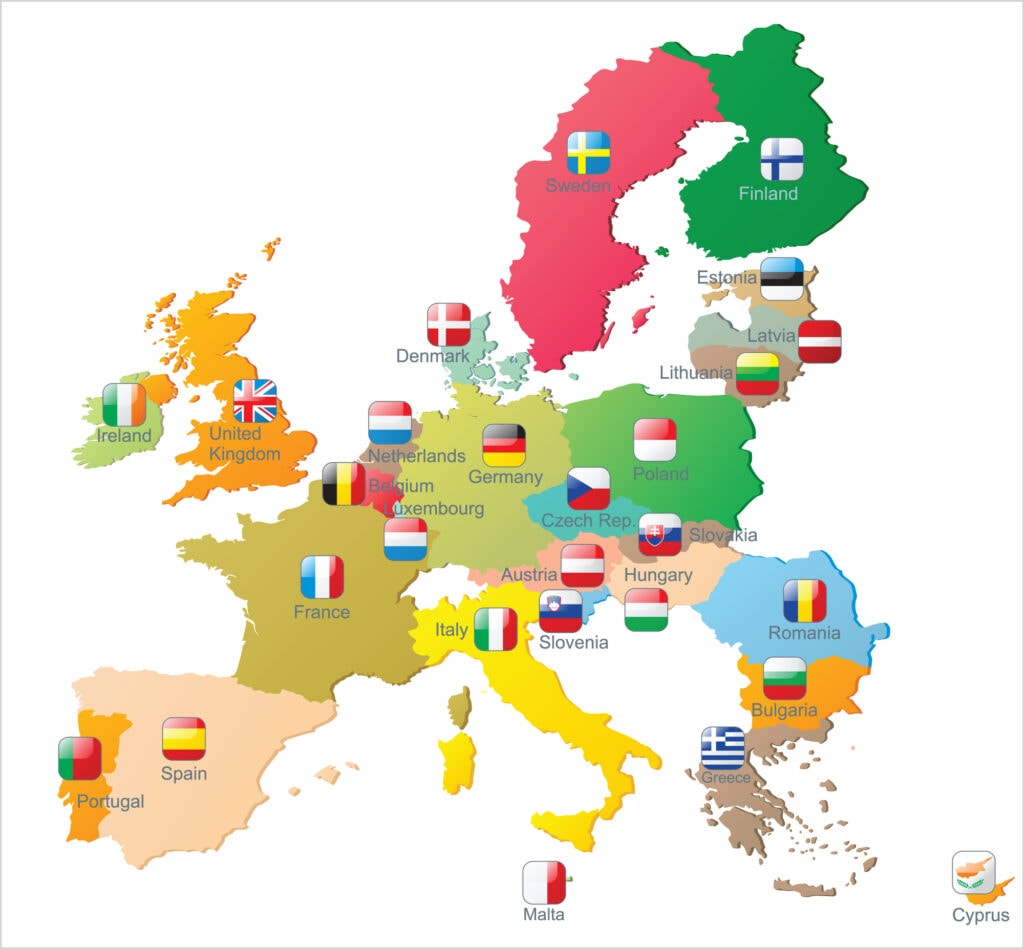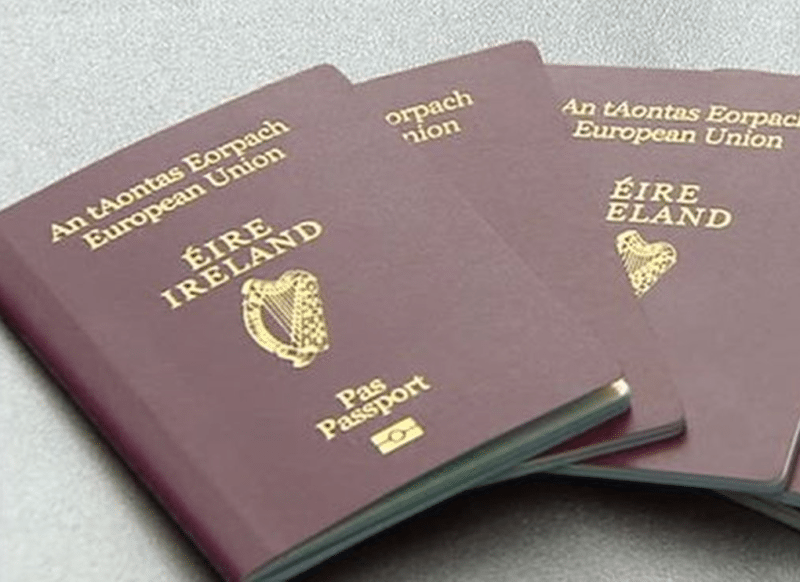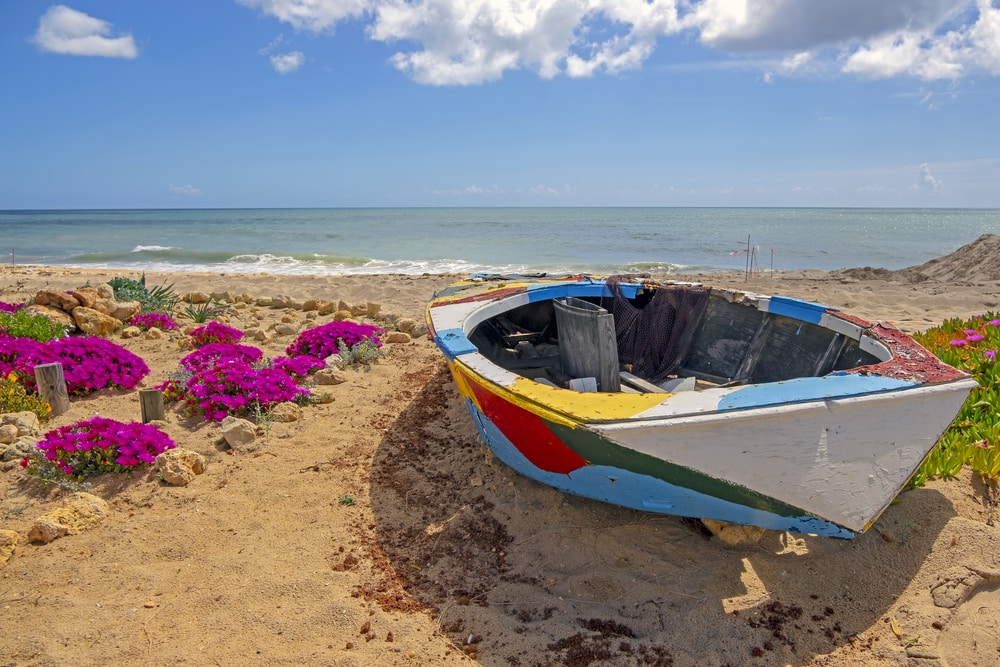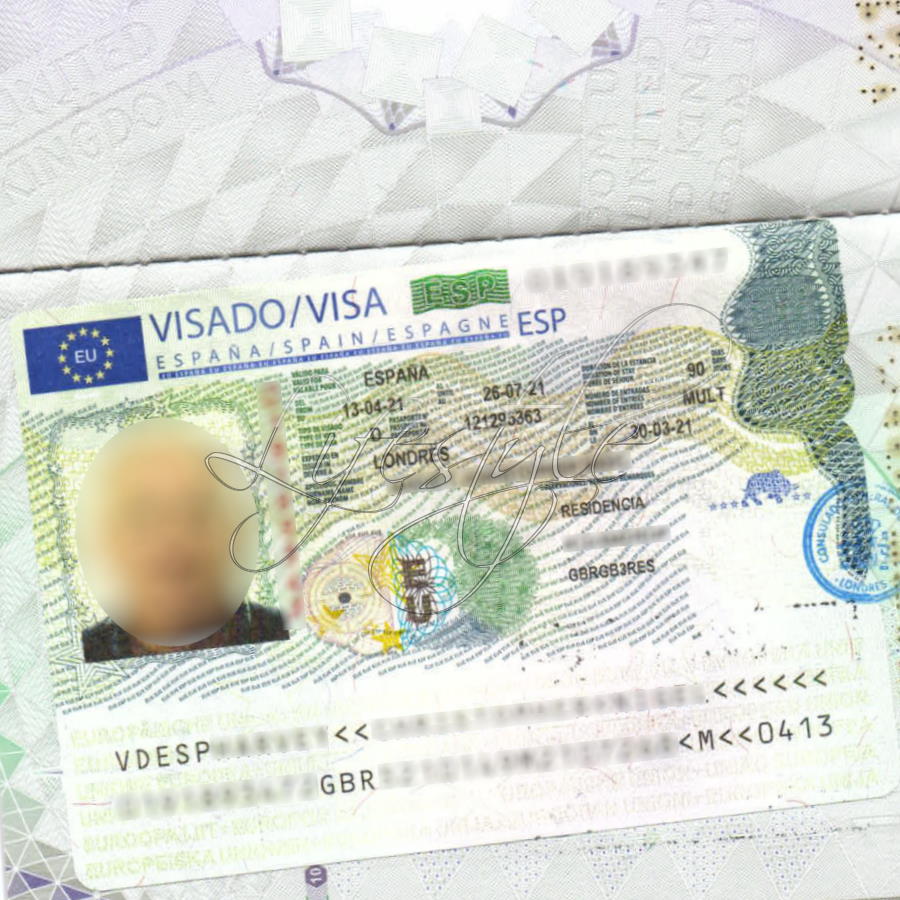How to get an EU passport and get EU citizenship
Obtaining an EU passport and EU citizenship has become an increasingly attractive prospect for many individuals worldwide. The benefits of holding an EU passport are numerous, offering unrestricted access to work, study, and reside in any of the 27 member states of the European Union. Additionally, having an EU passport grants the holder the right to vote in European Parliament elections, providing them with a say in shaping the future of the EU.

I obtained my EU passport as a citizen of Northern Ireland. In Northern Ireland you can choose to have either British citizenship or Irish being born on the Island. I chose Irish to avoid the pitfalls of Brexit. My husband obtained his Irish Passport via descent as he was born in England but his parents were both born in Ireland.
- How to get an EU passport and get EU citizenship
- EU passport eligibility
- What is EU Citizenship?
- Ways to Obtain EU Citizenship
- How to Get an EU Passport
- EU Countries That Offer Citizenship by Investment
- Can US Citizens Get EU Citizenship?
- Become a Digital Nomad
- Austria holocaust citizenship
- Frequently Asked Questions
- Q: How can I become an EU citizen?
- Q: What is the easiest nationality to get in Europe?
- Q: What are the benefits of EU citizenship?
- Q: Can I get EU citizenship as an American?
- Q: How can I get a European passport?
- Q: What is a golden visa?
- Q: Can I have dual citizenship as an EU citizen?
- Q: How can I obtain citizenship through ancestry?
- Q: How do i apply for an EU passport?
- Q: Which countries in Europe offer citizenship by investment programs?
- Q: What are the requirements to get citizenship in Europe?
- Q: What are the ways to obtain a passport in Europe?
- Q: Can you live anywhere in Europe with an EU passport?
- Conclusion
Xyuandbeyond is reader-supported. When you buy through links on our site, we may earn an affiliate commission. You can read my privacy policy here.
EU passport eligibility
While the process of obtaining an EU passport and citizenship may seem daunting, it can be navigated through various avenues. One of the most common ways is by descent, wherein individuals with parents or grandparents who are EU citizens can claim citizenship themselves.
Another route is through marriage or civil partnership to an EU citizen, which can lead to a fast-track process in gaining citizenship. Another popular option is by investing in an EU country, often through a citizenship by investment program. These programs vary from country to country, but typically involve making a significant financial contribution to the economy in exchange for citizenship.

What is EU Citizenship?
European citizenship is a concept introduced by the Maastricht Treaty in 1992, which grants citizens of EU Member States certain rights and freedoms. EU citizenship complements national citizenship and gives individuals the right to move, reside, and work freely within the EU territory.
Overall, EU citizenship plays a crucial role in promoting European unity and enabling individuals to fully benefit from the advantages of the EU membership.
Definition of EU Citizenship
EU citizenship is a legal concept referring to the rights and privileges granted to individuals who are citizens of a European Union member state. It was introduced in 1992 with the signing of the Maastricht Treaty and is in addition to national citizenship.
EU citizens are entitled to several key rights, including the freedom to move and reside within the EU, the right to vote and stand in local and European elections, as well as consular protection from any EU country outside their own.
It also guarantees equal treatment in terms of access to employment, social benefits, and healthcare. EU citizenship has provided individuals with additional opportunities and mobility within the European Union.

Benefits of EU Citizenship
One of the primary advantages is the freedom to move and reside freely within any member state of the European Union. This means that EU citizens can study, work, or live in any country within the EU without needing to obtain a visa or work permit.
Additionally, EU citizens have the right to vote and stand as candidates in European Parliament and local elections. They also benefit from consular protection and support from any EU embassy or consulate worldwide.
EU citizenship provides access to social security benefits, such as healthcare and education, in any member state. Overall, EU citizenship offers extensive rights and opportunities for individuals, making it highly desirable.
Ways to Obtain EU Citizenship
There are several ways to obtain EU citizenship. One common route is through ancestry. If you have parents or grandparents who were born in an EU country, you may be eligible for citizenship by descent. Another option is through marriage. If you marry an EU citizen, you may be able to acquire citizenship through the process of naturalization.
Additionally, some EU countries offer citizenship by investment, where individuals can obtain citizenship by making a significant economic contribution to the country. Finally, some EU countries offer citizenship through a lengthy period of residency, ranging from 5 to 10 years, during which individuals must live and work in the country before becoming eligible for citizenship by naturalization.
Several European countries grant citizenship to individuals affected by World War II and the Nazis as a way of acknowledging the historical injustices endured by these people. This initiative aims to provide a sense of belonging and restore the rights that were violated during that dark period. Germany, for instance, offers citizenship to descendants of victims of Nazi persecution, including Holocaust survivors, who lost their citizenship due to the policies of the Nazi regime.
Austria is another country that grants citizenship to those who were expelled or forced to flee during World War II. This allows them to reconnect with their heritage and feel a part of the country that once turned its back on them.
Similar initiatives exist in Hungary, Lithuania, Latvia, and Estonia, where individuals and their descendants who were forcibly displaced during the war can reclaim their identity and regain the rights and privileges they were once denied. In granting EU citizenship to those affected by WWII and the Nazis, these countries not only acknowledge the atrocities committed but also work towards rectifying the injustices inflicted upon innocent people who suffered greatly during this dark chapter in history.
Obtaining EU Citizenship by Investment
Obtaining EU citizenship by investment is a process that allows individuals to become citizens of a European country by making a significant investment in that country. This can include investment in real estate, business, or government bonds.
The main benefit of obtaining EU citizenship through investment is the ability to live, work, and study in any EU country without any restrictions. It also provides access to social benefits, healthcare, and education in EU member states. Additionally, having EU citizenship offers visa-free travel to many countries around the world. However, the specific requirements and investment options vary from country to country within the EU.
Obtaining EU Citizenship by Naturalization
Obtaining EU citizenship by naturalization entails fulfilling certain criteria set by each individual member state. Generally, applicants must have resided legally in the country for a specific number of years, typically ranging from five to ten years. During this period, they must have demonstrated good conduct, knowledge of the country’s language, and integrated into the local community.
Additionally, some applicants are expected to renounce their previous citizenship, prove their financial stability, and pass a thorough background check. Once granted, EU citizenship provides rights such as free movement within the EU, the ability to vote in EU elections, and access to various social and economic benefits.
Obtaining EU Citizenship by Descent
Obtaining EU citizenship by descent refers to the process of acquiring citizenship in a European Union country through lineage or ancestry. This means that if an individual’s parent or grandparent is a citizen of an EU member state, they may be eligible to claim citizenship themselves.
The criteria and requirements may vary between different EU countries, as each nation has its own laws and regulations regarding citizenship by descent. Generally, applicants must provide evidence of their familial connection, such as birth or marriage certificates, and may need to prove their knowledge of the country’s language or culture.
It is important to note that acquiring EU citizenship through descent does not automatically grant all the rights and benefits of being a citizen, such as freedom of movement and access to social services. Potential applicants should thoroughly research the specific requirements for their desired EU country before starting the application process.
Obtaining EU Citizenship by Marriage
Obtaining EU citizenship through marriage is a common route for individuals who wish to gain legal residency and the right to work in an EU member country. However, the process can vary depending on the country in which the marriage takes place.
Generally, the non-EU spouse must live with their EU partner for a certain period of time before they can apply for citizenship. They may also need to provide proof of a genuine and ongoing relationship, such as joint bank accounts or utility bills. Additionally, some countries may require the individual to pass a language test or attend integration classes before granting citizenship.
It is important to note that obtaining EU citizenship through marriage does not automatically grant the same rights and privileges as those acquired through birth or descent. However, it can provide a gateway to living and working within the EU, as well as access to public services and benefits.
How to Get an EU Passport
There are several ways to obtain an EU passport, depending on your circumstances. If you have a European ancestry, you may be eligible to apply for citizenship through descent. This typically requires gathering documents such as birth certificates, marriage certificates, and evidence of your relationship to the European ancestor.

Another option is to marry a citizen of an EU member state, which can fast-track your eligibility for citizenship. Additionally, some countries offer residency programs that lead to citizenship after a certain period of time. These programs often require meeting specific investment or employment criteria. It is advisable to consult with immigration lawyers or official government websites to understand the specific requirements and processes involved in obtaining an EU passport.
How to plan your trip to the UK and Ireland
Requirements for Obtaining an EU Passport
To obtain an EU passport, individuals typically need to meet a set of requirements. These include having a valid residence permit in an EU country, living there for a certain period, demonstrating a reliable source of income, and having basic language skills. Additionally, applicants may need to provide documents such as birth certificates, marriage certificates, and proof of funds. Each EU country may have slightly different requirements.
Applying for an EU Passport
Applying for an EU passport can open up a range of opportunities. With an EU passport, you can live, work, and travel freely within the European Union. The process usually involves gathering the necessary documents, such as proof of citizenship and identity, and submitting an application form. It is important to check the specific requirements of the country you are applying through, as they may vary slightly. Once approved, you can enjoy the benefits of being an EU citizen.
EU Countries That Offer Citizenship by Investment
Several European Union (EU) countries offer citizenship by investment programs. These programs allow individuals to obtain citizenship and a second passport by making a significant investment in the country. Some EU countries that offer these programs include Cyprus, Malta, and Bulgaria. The requirements and investment amounts vary from country to country, but the benefits include visa-free travel, access to the EU market, and the right to live and work in any EU country.
List of EU Countries that Offer Citizenship by Investment
There are several EU countries that offer citizenship by investment, providing individuals with an opportunity to obtain a second passport and enjoy the benefits of EU citizenship. These countries include Austria, Cyprus, Malta, Montenegro, North Macedonia, Turkey and Portugal, among others.
Each country has its own investment requirements and conditions that need to be met in order to qualify for citizenship. For example, in Cyprus, investors can gain citizenship by either investing in real estate or making a significant contribution to the country’s economy.
Malta also offers a citizenship program whereby investors can make a donation to the National Development and Social Fund and invest in real estate or government bonds. Portugal offers a Golden Visa program, which allows investors to acquire residency and eventually citizenship by investing in real estate or creating jobs.

Benefits of Citizenship by Investment
Citizenship by investment programs offer a multitude of benefits for individuals seeking a second passport. One of the key advantages is the ability to obtain citizenship or permanent residency in a relatively short period of time. Traditional means of acquiring citizenship, such as through ancestry or marriage, can be lengthy and complex processes.
Citizenship by investment, on the other hand, typically allows applicants to obtain citizenship within a matter of months. Another major benefit is the freedom of movement that comes with a second passport. Citizenship in certain countries can grant individuals visa-free or visa-on-arrival access to a large number of countries, expanding their travel and business opportunities.
Additionally, citizenship by investment often provides individuals with increased security and stability. Political unrest or economic crises in their home country may drive individuals to seek an alternative citizenship as a form of insurance. Overall, citizenship by investment offers a range of advantages that make it an appealing option for those looking to enhance their global mobility and safeguard their future.
Can US Citizens Get EU Citizenship?
US citizens do not have a direct path to obtaining European Union (EU) citizenship. Each EU member country has its own citizenship laws and requirements. In most cases, acquiring EU citizenship is based on factors such as ancestry, marriage to an EU citizen, or long-term residence in an EU country.
However, US citizens can live and work in an EU country by obtaining a long-term visa or a work permit. Some EU countries offer residency programs that may lead to eventual citizenship, such as Spain’s Golden Visa or Portugal’s Golden Residence Permit.
These programs typically require a significant investment in the country, such as purchasing property or creating jobs. It is important for US citizens to research the specific citizenship laws and requirements of the EU country they are interested in and consult with legal professionals to determine the best path towards obtaining EU citizenship.
Eligibility of US Citizens for EU Citizenship
US citizens are not automatically eligible for EU citizenship. The European Union, made up of 27 member states, has its own set of rules and requirements for acquiring citizenship. In general, citizenship in an EU country is based on birthright, descent, marriage, or naturalization.
US citizens can potentially become EU citizens through descent if they have a parent or grandparent who was a citizen of an EU member state. In some cases, individuals may also be eligible for citizenship through marriage if they are married to an EU citizen.
However, this process can vary in each member state, and certain conditions may need to be met. In terms of naturalization, US citizens would need to reside in an EU country for a certain period of time, typically between 5 to 10 years, before becoming eligible for citizenship. It is important to research the specific requirements of the country in which one is interested in obtaining citizenship to ensure eligibility.
Process for US Citizens to Obtain EU Citizenship
To obtain EU citizenship, US citizens must first meet the eligibility criteria set by the EU member state they wish to be a citizen of. In general, this involves having a legal and continuous residence in the chosen EU country for a specific period, usually five years.
During this time, US citizens need to demonstrate their integration into the society by acquiring a good knowledge of the language and culture, as well as obeying the country’s laws. After meeting these requirements, US citizens can apply for EU citizenship through naturalization. This process typically involves submitting an application form, providing relevant documents such as a valid passport, proof of residence, and evidence of language proficiency.
Additionally, an interview and a citizenship test may be required to assess the applicant’s knowledge of the country and its values. Once granted EU citizenship, US citizens enjoy the benefits of free movement within the European Union, including the right to live, work, and vote in any EU member state.

Become a Digital Nomad
Get a Digital Nomad Visa. Each country issuing digital nomad visas has its own policies and regulations in place, most of these visas are only valid for a period of one year. A Nomad visa is subject to various rules including a minimum level of income and a health insurance plan. These can be provided for countries including Croatia, Czech Republic, Estonia, Germany, Greece, Hungary, Iceland, Italy, Malta, Portugal, Romania, and Spain, with more being arranged every day.
Digital Nomad Freelance Visas In Germany. In Europe, the first nation to create a freelance visa was Germany. There are 2 types of freelance visas (also called freiberufler visas): one for artists and one for other professionals. Digital nomads must register with the German tax office and submit a series of documents such as their portfolio, bank statements, and in some cases, evidence of their expertise. Freelancers must have clients based in Germany.
Austria holocaust citizenship
The Austrian Supreme Administrative Court (“Verwaltungsgerichtshof”) decided in 2001 that victims of National Socialism were forced to leave Austria and therefore did not voluntarily acquire another citizenship and hence not lose Austrian citizenship and applying for Austrian citizenship by descent is possible. If you have Austrian ancestry take a look at obtaining Citizenship for Persecuted People and see if you are eligible.
Frequently Asked Questions
Q: How can I become an EU citizen?
A: There are several ways to become an EU citizen. One way is through citizenship by descent, if you have ancestry from a European country. Another way is through citizenship by naturalization, which generally requires living in an EU country for a certain period of time and meeting specific criteria set by that country.
Q: What is the easiest nationality to get in Europe?
Portugal is the easiest European country where you can get citizenship. The easiest way to become a Portuguese citizen is by obtaining a Portugal Golden visa; all you have to do is invest in a house, a business, or a property of €500,000 value.
Q: What are the benefits of EU citizenship?
A: EU citizenship grants you the right to live, work, and study in any EU country. It also gives you access to various benefits and services, such as healthcare, social security, and education, across all EU member states. Additionally, EU citizens have the right to vote and stand as a candidate in European Parliament elections.
Q: Can I get EU citizenship as an American?
A: Yes, it is possible for Americans to obtain EU citizenship. The process typically involves meeting the requirements set by the individual EU country you wish to become a citizen of. These requirements may include living in the country for a certain period of time, having a stable source of income, and demonstrating knowledge of the country’s language and culture.
Q: How can I get a European passport?
A: To get a European passport, you need to become a citizen of an EU country. This can be done through various means, such as citizenship by descent, citizenship by naturalization, or citizenship through marriage. Each country has its own specific requirements and process for obtaining citizenship and a passport.
Q: What is a golden visa?
A: A golden visa is a residency by investment program offered by some EU countries, such as Portugal and Malta. It allows individuals to obtain residency and, in some cases, citizenship by making a significant investment in the country, such as purchasing real estate or investing in local businesses.
Q: Can I have dual citizenship as an EU citizen?
A: Most EU countries allow dual citizenship, which means you can be a citizen of both your home country and an EU country. However, there are some exceptions and restrictions, so it is important to check the specific laws of the countries involved before acquiring dual citizenship.
Q: How can I obtain citizenship through ancestry?
A: If you have ancestry from an EU country, you may be eligible for citizenship by descent. This typically involves providing documentary evidence to prove your ancestral connection and meeting other requirements set by the country, such as language proficiency or proof of financial stability.
Q: How do i apply for an EU passport?
First trace your ancestry to see if your parents or grandparents were born in an EU country. At that point you will need to obtain their birth and marriage certificates and then you can begin the process of applying for citizenship via ancestry within that country. An EU passport is really a passport for the country you may be able to gain citizenship via ancestry.
Q: Which countries in Europe offer citizenship by investment programs?
A: Several EU countries offer citizenship by investment programs, including Cyprus, Malta, and Portugal. These programs allow individuals to obtain citizenship by making a significant investment in the country, such as purchasing real estate or contributing to the local economy.
Q: What are the requirements to get citizenship in Europe?
A: The requirements to obtain citizenship in Europe vary depending on the country you are applying to. Generally, these requirements may include residency, language proficiency, knowledge of the country’s history and culture, and a clean criminal record. It is advisable to consult the specific requirements of the country you are interested in for more accurate information.
Q: What are the ways to obtain a passport in Europe?
A: There are various ways to obtain a passport in Europe, including obtaining citizenship through ancestry, marriage, or naturalization. In some cases, individuals may also be able to obtain a European passport through residency by investment programs offered by certain countries.
Q: Can you live anywhere in Europe with an EU passport?
According to the European Union as an “EU national, you have the right to live and move within the EU without being discriminated against on the grounds of nationality. You can also benefit from greater consumer protection than in your home country and, provided you meet certain requirements, can access healthcare anywhere in the EU.”
Conclusion
In conclusion, EU citizenship offers numerous benefits and opportunities for its citizens. It provides the right to freely travel, live, and work within any EU member state, fostering mobility and cultural exchange. EU citizenship also grants individuals the right to vote and stand as candidates in local and European Parliament elections, a crucial element in promoting active civic participation. Addit
ionally, EU citizens benefit from consular protection from any EU member state when outside the EU, ensuring their safety and wellbeing. Furthermore, EU citizenship entitles individuals to social and economic rights, such as access to healthcare, education, and social welfare. These rights are crucial in ensuring equal opportunities and social inclusion for all EU citizens. However, the concept of EU citizenship is not without challenges, including issues related to national sovereignty and the potential for abuse. Nonetheless, the advantages bestowed by EU citizenship far outweigh any drawbacks, making it a valuable and significant status for individuals across the European Union.
How to become a digital nomad – digital nomad visa Europe
Planning on retiring to Ireland? Here’s what you need to know.
Did you know if you are a spouse of an EEA/EU citizen, you are still required to apply for a Schengen visa? Read Rayazan’s post on her blog EverythingZany to learn more about applying for a Schengen Visa from the UK
What’s your experience been like getting an EU Passport?
You might also like
My Move to Europe – 21 personal stories
Pros and Cons of Living in Barcelona
20+ Pros and Cons of Living in Spain
The Pros and cons of living in Sweden
Pros and Cons of Living in France
Pros and Cons of Living in Portugal: On the Algarve
Pros and Cons of Living in UK: Expat Life in England
Tips for Canadians moving to Ireland
How to move to the Netherlands From Asia
Discover the Pros and Cons of Living in Austria
Buying a plot of land in Ireland: How to buy property
Pros and Cons of Living in Cyprus
Move to Ireland: the ultimate guide on moving to Ireland – Irish citizenship through grandparents via descent
Getting an EU Passport or EU Citizenship Pin – save it for later

